Laboratories

Laboratories
The laboratories are essential for research in Engineering and Architecture. These have a crucial role in the education of students, both in training and in laboratory experiences directly carried out by students.
At DECivil there are currently the following laboratories:
Experimental Laboratories:
- Architecture
- Construction
- Structures and Strength of Materials
- Geotechnics
- Hydraulics, Water Resources and Environment
- Transport Infrastructures
Informatic Laboratories:
Experimental Laboratories
The main objective of IST Architecture Research Laboratory (ISTAR) is to support research and teaching in the field of architecture. It comprises two laboratories: the Laboratory of Computational Architecture (LAC), dedicated to the creation of digital, virtual, and physical models of buildings; and the Laboratory of Bioclimatic Architecture (LAB), dedicated to the study of the performance of buildings, either individually or in an urban context.
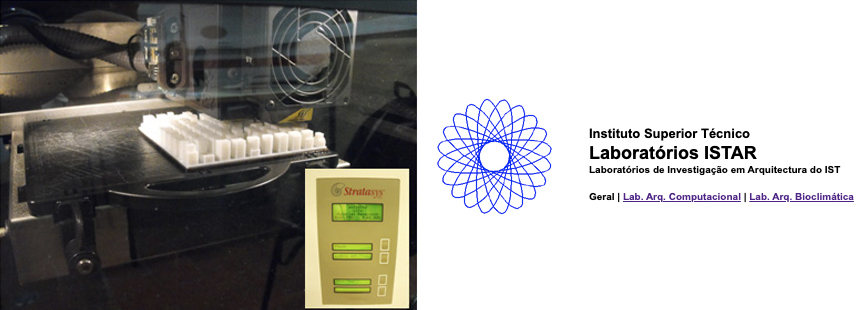
Head of the Laboratory: Prof. Manuel de Arriaga Brito Correia Guedes (manuel.guedes@tecnico.ulisboa.pt)
The Laboratory of Construction (LC) supports experimental activities associated with teaching, research and other scientific and technical activities in the areas of production, technology and performance of materials, products and construction systems in buildings. The LC has a wide range of equipment that enables relevant laboratory and in-situ testing to support the design, quality control and performance assessment in the construction and operational phases of building construction and rehabilitation.
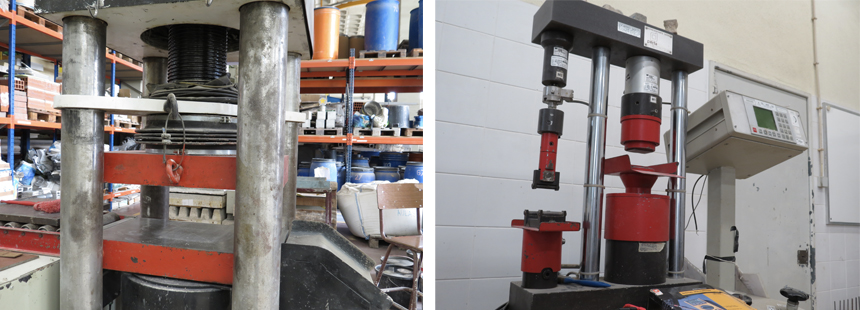
Head of the Laboratory: Prof. José Alexandre de Brito Aleixo Bogas (jose.bogas@tecnico.ulisboa.pt)
Laboratory Technicians: Francisco José Amorim de Almeida (francisco.almeida@tecnico.ulisboa.pt)
The Laboratory of Structures and Strength of Materials (LERM) performs teaching, research and consulting works in the field of strength of materials and civil engineering structures. LERM has a large set of equipment that allows testing and studies in the areas of static and dynamic analysis and design of concrete structures, steel and steel-concrete composite structures, masonry and composite structures, as well as in the area of durability and strengthening of structures.
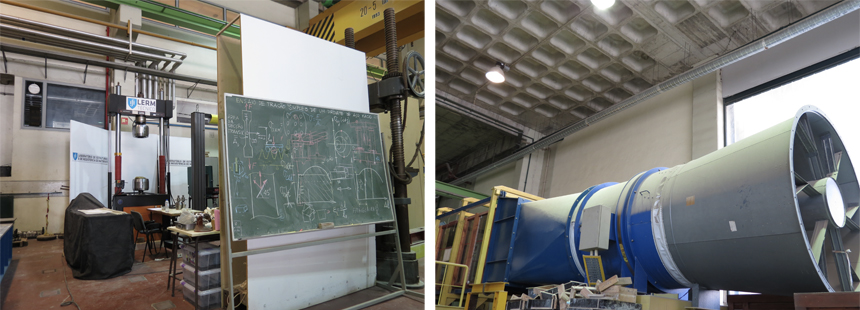
Head of the Laboratory: Prof. José Oliveira Pedro (jose.oliveira.pedro@tecnico.ulisboa.pt)
Laboratory Technicians: Fernando Alves (fernandomalves@tecnico.ulisboa.pt) e Jorge Pontes (jorge.pontes@tecnico.ulisboa.pt)
The Geotechnics Laboratory (LabGeo) actively participates in experimental teaching at DECivil, supporting projects and research in the field of physical, mechanical and hydraulic characterization of geomaterials, providing all the necessary means for the development of master and doctoral theses. Besides having equipment to carry out static and cyclic (dynamic) laboratory tests under saturated or unsaturated conditions to characterize the hydromechanical behavior of geomaterials, LabGeo has a wide range of equipment that allow carrying out field tests, including field tests, namely load tests and quality control of piles, and in situ seismic tests.
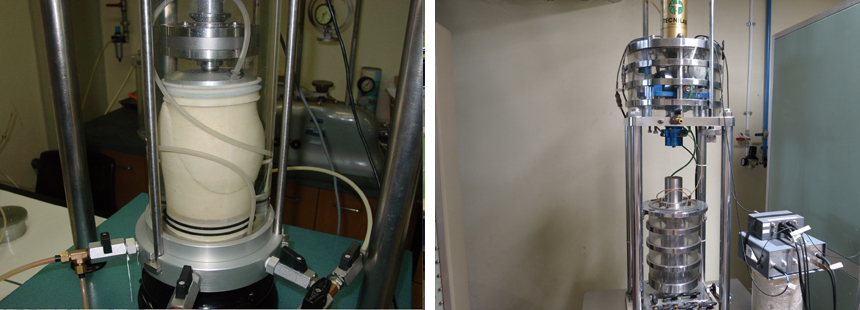
Head of the Laboratory: Prof. Rafaela Cardoso (rafaela.cardoso@tecnico.ulisboa.pt)
Laboratory Technicians: Jorge Pontes (jorge.pontes@tecnico.ulisboa.pt)
The Laboratory of Hydraulics, Water Resources and Environment is one of the laboratories of the Department of Civil Engineering, Architecture and Earth Resources, having as main activities Teaching, Research and Development (R&D) and Specialized Consultancy in the domain of Hydraulics of open channel and pressurized-pipe flows. With a total area of ca. 670 m2, distributed in level -1 (ca. 100 m2) and -2 (ca. 570 m2) of the Civil Engineering Building, the laboratory has several experimental facilities composed of flumes and pressurized pipes, fully equipped with state-of-the-art instrumentation for the development of laboratory and field tests (e.g., particle image velocimeter, PIV; particle tracking velocimetry, PTV; acoustic doppler velocimeters, ADV; ultrasonic velocity profilers, UDP; electromagnetic and ultrasonic flowmeters; pressure, torque, temperature, conductivity and rotational speed sensors; laser and micro-echo-sounders). Most relevant facilities are the morphodynamics of river flume, the confluences flume, the mechanics of granular media in 3D turbulent flows flume, the hydraulic structures and pool-type fishways flume and the armour blocks stability on rubble mound breakwater flume, as well as several pressurized pipe circuits, made of steel, copper, polyethylene and acrylic, for the study of phenomena associated with hydraulics transients (e.g. effect of air pockets, cavitation, pipe wall viscoelasticity and leak detection) and for testing small-hydropower machines (pumps, turbines, water wheels). The laboratory also has multiple hydraulic benches (e.g., friction and local head losses, momentum flux, free and forced vortices, pumps, turbines, weirs, Reynolds experience, flow visualization, percolation) and a flume for teaching open channel flows at the Bachelor and Master levels. Several competitive research projects (national and international) are developed using existing and specially assembled facilities, in several the referred domains of Hydraulics and many master and doctoral projects with experimental analysis are also conducted in this laboratory in the scope of the Civil Engineering, Environmental Engineering and Mechanical Engineering courses.
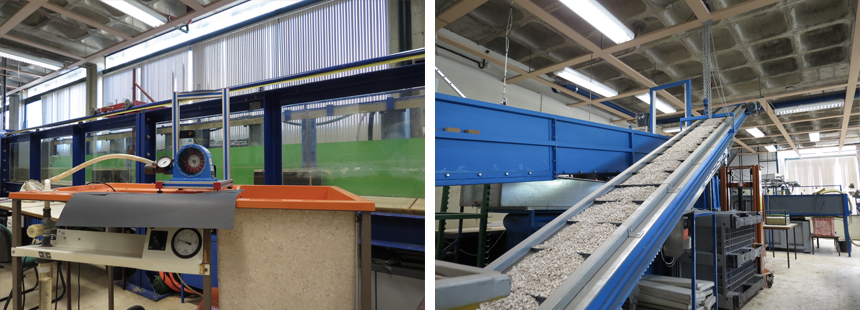
Head of the Laboratory: Prof. Dídia Isabel Cameira Covas (didia.covas@tecnico.ulisboa.pt)
Laboratory Technicians: Francisco José Amorim de Almeida (francisco.almeida@tecnico.ulisboa.pt)
The Laboratory of Transport Infrastructures (LVCT) is an experimental laboratory supporting teaching, research and technology transfer activities involving public and private institutions in the fields of pavement mechanics, traffic engineering, infrastructure management, and monitoring of service and safety conditions. LVCT can carry out all relevant tests regarding quality control and performance assessment of paving materials. The tests performed range from laboratory characterization of materials to in-situ bearing capacity of highways and airports pavements, foundation and ballast of railways, as well as traffic counts and dynamic monitoring. LVCT is located in floor -1 (room 01.10) and floor -2 (room 02.28) of civil engineering building.

Head of the Laboratory: Prof. Luís Picado Santos (luispicadosantos@tecnico.ulisboa.pt)
Laboratory Technicians: Rui Garcia (rui.garcia@tecnico.ulisboa.pt)
Laboratórios Informáticos
The Computational Mechanics Laboratory (LMC) has as main objectives the administration of the computer park installed in the Department of Civil Engineering, Architecture and Georesources, with the provision of specialized IT support to its users.

Head of the Laboratory: Prof. Fernando Manuel Fernandes Simões (fernando.simoes@tecnico.ulisboa.pt)
Laboratory Technicians: Filipe Alexandre Batista dos Santos Aparício (filipe.aparicio@tecnico.ulisboa.pt)
The Information Technology Laboratory (LTI - CIVMAT) serves bachelor and master's students of the Department of Civil Engineering and Architecture, providing support to their academic work and serving as a space for holding classes in the various courses that require the use of an laboratory equipped with computer equipment.

Head of the Laboratory: Prof. Fernando Manuel Fernandes Simões (fernando.simoes@tecnico.ulisboa.pt)
Laboratory Technicians: Filipe Alexandre Batista dos Santos Aparício (filipe.aparicio@tecnico.ulisboa.pt)